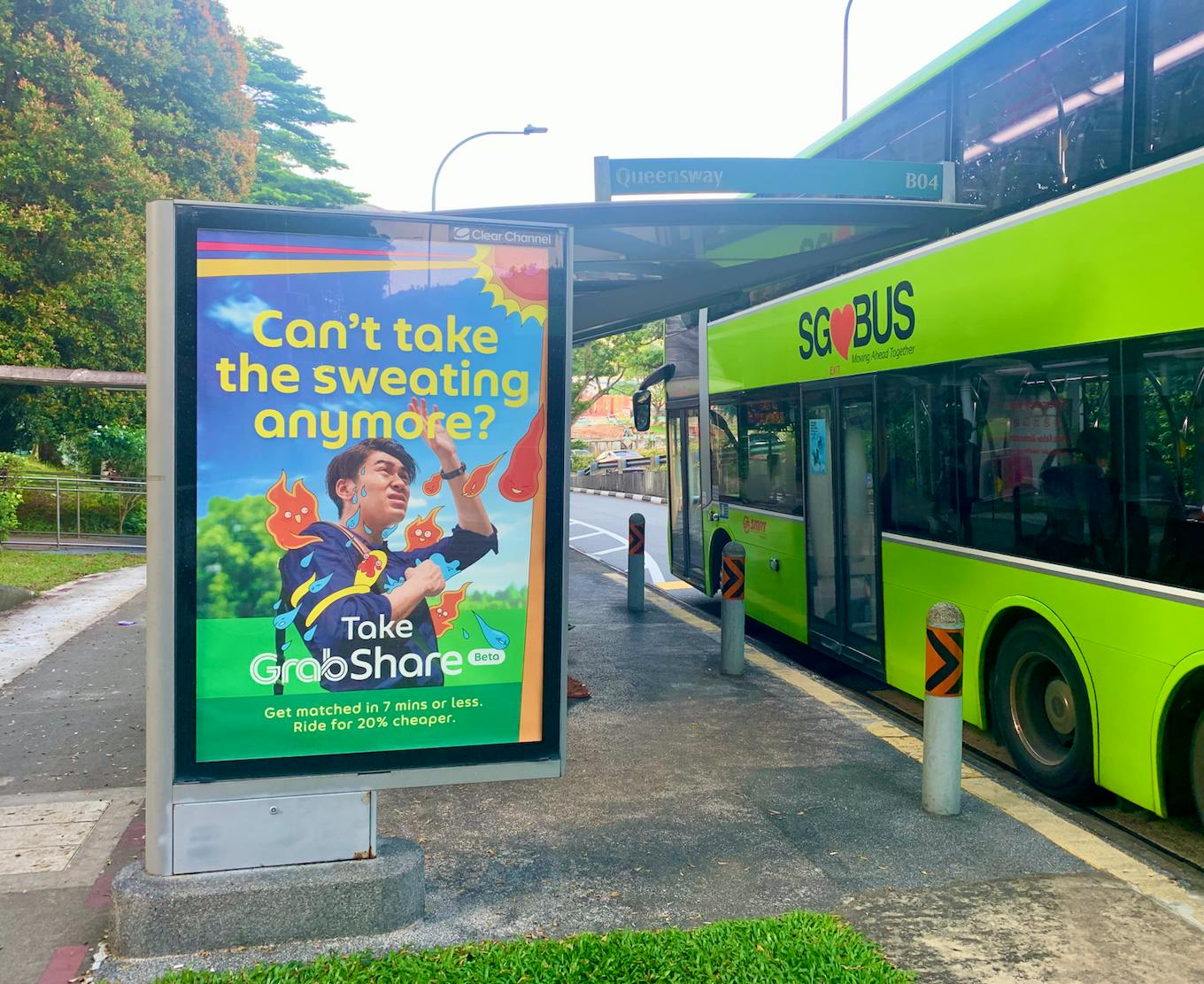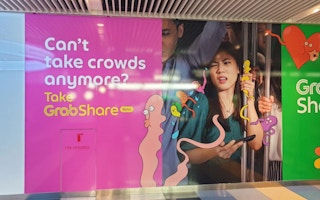Complaints made about the climate implications of an advertising campaign for ride-hailing app Grab that encourages Singapore commuters to use private cars instead of public transport have been dismissed by the country’s advertising watchdog.
To continue reading, subscribe to Eco‑Business.
There's something for everyone. We offer a range of subscription plans.
- Access our stories and receive our Insights Weekly newsletter with the free EB Member plan.
- Unlock unlimited access to our content and archive with EB Circle.
- Publish your content with EB Premium.
Advertisements running on billboards around the city appeal to commuters to escape from the sweltering heat and packed subway trains for the relative comfort of Grab’s ride-share service. “Can’t take anymore crowds? Take GrabShare,” reads one poster on Singapore’s MRT subway system. “Can’t take the sweating anymore? Take GrabShare,” reads another billboard by a bus stop.
The campaign flies in the face of a national policy to encourage Singaporeans to be more actively mobile and use public transport, hampers Singapore’s climate ambitions by promoting carbon-intensive transport, worsens road traffic and increases the city-state’s reliance on fossil fuels, according to a complaint filed to the Advertising Standards Board of Singapore (ASAS).
For these reasons, the campaign flouts Singapore’s advertising code, which requires that campaigns “have a sense of responsibility to the consumer and society” and “do not subvert shared values in Singapore’s society”, said finance executive M. Hicke in his complaint to ASAS, seen by Eco-Business.
As part of Singapore’s national “green plan“, the tropical country is aiming to reduce transport emissions by 80 per cent from 2016 levels by the end of the century by encouraging people to walk and cycle more, use public transport, and bring about a “car-lite” society.
The government wants public transport to account for two-thirds of peak-hour commuter journeys by 2030, an ambition that Grab’s campaign actively hinders, Hicke’s complaint points out.

An outdoor advertisement for ride-hailing service Grab, placed next to a bus stop, encourages Singapore residents to escape the heat and use its ride-share service, GrabShare. The campaign is running after a period of record-high temperatures in the heavily urbanised city-state. Image: Robin Hicks/Eco-Business
However, the ASAS determined that the campaign did not breach Singapore’s advertising code, because “it did not misrepresent or denigrate the experience of taking public transport in a way that would be taken seriously by its viewers.”
“The Council also considered that it promoted carpooling over individual ride-sharing journeys that would have a greater environmental impact,” ASAS chairman Ang Peng Hwa, who is also professor of Wee Kim Wee School of Communication at Nanyang Technological University, told Eco-Business.
Grab has not responded to a request for comment.
Grab’s campaign is only the second advertisement that has generated an environmentally-related complaint since 2021, according to ASAS. The other complaint questioned a shopping mall’s criteria for selecting “green retail stores”. The complaint was also dismissed by the advertising industry-backed self-regulator, which was formed in 1976 to promote ethical advertising in Singapore.
The news emerges a month after Grab launched its latest environmental, social and governance (ESG) report, which showed a 123 per cent spike in year-on-year greenhouse gas emissions from its fleet of more than 5 million vehicles in operation across eight Southeast Asian countries. Grab blamed the emissions jump on post-Covid demand rebound and the addition to its carbon inventory of a newly acquired supermarket business.
Grab pledged to be carbon neutral by 2040 a year ago, a strategy the company is pursuing by electrifying its fleet, running operations on renewable energy, and investing in carbon removal programmes. The company’s sustainability director said last year that the firm’s push for “inclusive” decarbonisation – electrifying its fleet without marginalising its drivers – meant it could not align its carbon neutrality target with global goals to curb planetary heating.
Yesterday, 20 June, Grab announced it will sack 11 per cent of its work force to manage costs.

















